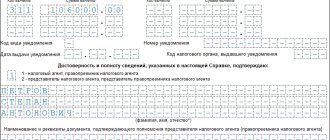Paragraph 1 of Articles of the Tax Code of the Russian Federation and other legislative acts in the field of fees and taxes explain the rules and procedure for imposing fines for late submission of balance sheets to the tax office. Submitting financial statements for review is the main method of control in business. Evasion of submitting such a document is equated to a gross form of violation, and therefore entails certain liability. The Federal Tax Service sets clear deadlines for submitting balance sheets for consideration. If the document has not been submitted by the last date of this period, then the entrepreneur will have to pay a fine of 200 rubles. Penalties are calculated for each individual document; each subsequent undelivered balance will also entail the need to pay funds.
The procedure for determining the amount of the fine, as well as the list of accounting records, failure to submit which the state may regard as a violation, are covered in letters from the Federal Fiscal Inspectorate. The papers have legal force, so they can be used by inspectors when assigning punishments and identifying the amount of penalties. The documents explain the procedure for determining the amount of punishment in each specific direction, so with their help you can understand any complex situation.
Fine and penalty: what are their differences?
It should be noted that a fine and a penalty are different concepts:
- The fine is assessed immediately when the above reasons occur. In addition, its size is clearly regulated by deadlines at the legislative level.
- A penalty is a penalty payment that is charged for each day of late payment as a percentage of 1/300 of the refinancing rate of the Central Bank of the Russian Federation.
The procedure for collecting taxes and penalties from organizations:
How to reduce the amount of the fine?
The first step is to contact the Federal Tax Service and sign the Inspection Report. From this moment on, the citizen has 14 days to write a petition with reference to Art. 114 of the Tax Code of the Russian Federation on reducing the amount of the fine. This paragraph states that if there is at least one mitigating circumstance (Article 112), the amount of the fine can be reduced by half. Such circumstances include the occurrence of an offense as a result of a combination of difficult personal, family circumstances, financial situation or under the influence of other circumstances, in particular:
- prosecution for the first time;
- whether the individual entrepreneur has dependents.
The more such circumstances are indicated in the petition, the more opportunities there are to reduce the fine.
Displaying tax penalties in accounting
To display the costs incurred that arise when fines and penalties are calculated, account 99 Profit and loss is used. For convenience, it is divided into two subcontos - penalties and fines. The debit of this account corresponds with the corresponding tax payment, which is displayed on the credit of accounts 68 and 69.
There are opinions in accounting circles that account 91 Other expenses can also be used to display accrued penalties and fines. However, in this case, a permanent tax liability arises, which somewhat complicates the process of accounting for them.
In addition, if accrued penalties and fines are displayed on 91 accounts, this will lead to a decrease in the tax base and will violate the authenticity of the information provided in the financial indicators of the organization.
Important! Penalties and fines recognized in accounting are not reflected in tax accounting, and therefore will not reduce your tax liability in any way.
Fines for different organizational forms
For different types of organizations, the size of the fine may be different. Moreover, each institution has its own rules for calculating fines, the procedure for assigning and determining them. The deadlines for filing financial statements also differ, so when starting your business, you need to clearly find out exactly when it is necessary to submit a balance sheet, when to close it and prepare it for consideration by the tax office. Having complete information in the field of taxation will allow you to avoid many problems in the process of activity.
Government institutions are no exception to the rules in the area of imposing fines for failure to submit financial statements. The basis for determining punishment is the order of the Ministry of Finance of the Russian Federation.
Municipal organizations submit the same set of accounting papers as private firms. Government agencies may be held accountable for failure to comply with general legal norms and standards.
Article 1 of the Tax Code of the Russian Federation regulates the procedure for punishing public organizations for evading the provision of balance sheets. Non-profit associations and their divisions do not have the right to carry out activities in the field of entrepreneurship, as well as to engage in the sale of goods, however, they may include real or retired property. As a result, public structures cannot receive income from business. However, any company of such an organizational structure always has sources of income to achieve its immediate goals. The accounting report of non-profit structures must contain the following information:
- clear purposes for using the funds received;
- sources of profit;
- areas of expenses (losses);
- methods of rational use of funds.
The functions of the tax office include checking organizations of this type. Fiscal authorities must clearly monitor the literacy and rational use of funds coming into the structure, since the main source of funds is most often the state. Evasion from submitting an accounting report may be regarded as a crime against the law. For each document not submitted on time, the management of the public association will be punished in the amount of 200 rubles. Subsequent deviations from the standards will be subject to mandatory penalties. Other types of structural organizations are required to submit the following financial statements to the fiscal authorities of the Russian Federation:
- profit summary;
- loss summary;
- papers on the auditor's report;
- document on the audit of the agricultural commission of cooperatives;
- explanatory note.
Note! An audit or revision is carried out for certain types of agricultural activities. If federal laws do not require an organization to conduct an audit, then the manager is not required to conduct this type of audit. However, the obligation to submit a balance sheet remains with the management of the agricultural enterprise. A fine for evading control will be mandatory.
Typical entries for the accrual and payment of fines and penalties for taxes
| Account Dt | Kt account | Transaction amount, rub. | Wiring Description | A document base |
| Accounting for fines and penalties on taxes on the account. 99 | ||||
| 99-1 | 68-4 (68-2, 68-1) | 19 000,00 | A fine was assessed for non-payment of tax (95,000.00*20%) | Buh. reference |
| 99-2 | 68-4 (68-2, 68-1) | 574,75 | A penalty has been charged for late payment of taxes. The delay was 22 days | Buh. reference |
| 68-4 (68-2, 68-1) | 51 | 19 574,75 | Payment of accrued fines and penalties for taxes | Plat. order |
| Accounting for fines and penalties on taxes on the account. 91 | ||||
| 91 | 68-4 (68-2, 68-1) | 574,75 | A penalty has been charged for late payment of taxes. The delay was 22 days | Buh. reference |
| 99-1 | 68-4 (68-2, 68-1) | 19 000,00 | A fine was assessed for non-payment of tax (95,000.00*20%) | Buh. reference |
| 68-4 (68-2, 68-1) | 51 | 19 574,75 | Payment of accrued fines and penalties for taxes | Plat. order |
| Accounting for fines and penalties on insurance premiums on the account. 99 | ||||
| 99-1 | 69 | 8 000,00 | A fine was assessed for non-payment of the insurance premium (40,000.00*20%) | Buh. reference |
| 99-2 | 69 | 275,00 | A penalty has been charged for late payment of the insurance premium. The delay was 25 days | Buh. reference |
| 69 | 51 | 8 275,00 | Payment of accrued fines and penalties on insurance premiums | Plat. order |
| Accounting for fines and penalties on insurance premiums on the account. 91 | ||||
| 91 | 69 | 275,00 | A penalty has been charged for late payment of the insurance premium. The delay was 25 days | Buh. reference |
| 99-1 | 69 | 8 000,00 | A fine was assessed for non-payment of the insurance premium (40,000.00*20%) | Buh. reference |
| 69 | 51 | 8 275,00 | Payment of accrued fines and penalties on insurance premiums | Plat. order |
| Imposition of a fine identified during an inspection | ||||
| 99 | 76 | 30 000,00 | Accrual of an administrative fine for non-use of cash registers for cash payments | Protocol |
| 76 | 51 | 30 000,00 | Payment of an administrative fine | Plat. order |
| Additional assessment of taxes and social contributions, payment of taxes and penalties | ||||
| 99 | 68-4 | 10 000,00 | Additional income tax accrual | Buh. reference |
| 90 (91) | 68-2 | 25 000,00 | Additional charge of underestimated VAT | Buh. reference |
| 20 (26, 44, 91) | 69 | 30 000,00 | Additional payment of insurance premium | Buh. reference |
| 91 (20, 26) | 68 | 15 000,00 | Additional assessment of property tax, land tax, transport tax | Buh. reference |
| If VAT is not restored | ||||
| 19 | 68-2 | 25 000,00 | Additional charge of underestimated VAT | Buh. reference |
| 91 | 19 | 25 000,00 | Inclusion of recovered VAT in expenses | Buh. reference |
| Input VAT was incorrectly accepted (reporting not signed) | ||||
| 68 | 19 | 47 000,00 | Additional VAT calculation | Buh. reference |
| 20 (26, 44, 90, 91) | 19 | 47 000,00 | Writing off input VAT on expenses | Buh. reference |
| 01 (04, 10, 41) | 19 | 47 000,00 | Inclusion of input VAT in the cost of the object | Buh. reference |
| 20 (26, 44) | 02 (05) | 7 000,00 | Additional depreciation charge for the amount of input VAT | Amor. statement |
| Input VAT was incorrectly accepted (the reporting was signed) | ||||
| 19 | 68 | 4 700,00 | Additional VAT calculation | Buh. reference |
| 91 | 19 | 4 700,00 | Writing off input VAT on expenses | Buh. reference |
| 01 (04, 10, 41) | 19 | 4 700,00 | Inclusion of input VAT in the cost of the object | Buh. reference |
| 20 (26, 44) | 02 (05) | 700,00 | Additional depreciation for the current year for the amount of input VAT | Amor. statement |
| 91 | 02 (05) | 320,00 | Additional depreciation for the past year in the amount of input VAT | Amor. statement |
Amount of fine for failure to submit a declaration
All organizations and entrepreneurs have uniform provisions for determining the amount of punishment. In other words, the amount of the fine for late submission of a tax return for any tax is determined using a single algorithm.
So, liability for late submission of a tax return is defined as 5% of the amount of the unpaid fiscal obligation to the budget. Moreover, this 5% will be charged for each month of delay, full or incomplete. However, the total amount of the fine for failure to submit a tax return cannot be more than 30% of the amount of tax not paid on time, but not less than 1000 rubles. Such instructions are enshrined in paragraph 1 of Art. 119 of the Tax Code of the Russian Federation, Letter of the Ministry of Finance dated August 14, 2015 No. 03-02-08/47033.
Until 2010
In letter No. 03-02-07 of the Ministry of Finance, the legislator separated the concepts of “declaration” and “advance calculation”. The taxpayer had to provide two different documents to the Federal Tax Service. This was contrary to Art. 119 of the Tax Code of the Russian Federation.
In the Presidium of the Supreme Arbitration Court No. 71, the arbitration court ruled that it is impossible to levy a fine for late submission of an advance payment calculation. But the inspectors had a different opinion on this matter. The basis for tax calculations is the amount calculated in the declaration. A fine will be charged for late submission. But! In ch. 215 of the Tax Code of the Russian Federation does not relate the imposition of a fine to the payment of tax. That is, the basis for applying sanctions may be untimely filing of a declaration for any period, regardless of whether an advance payment was made or not. Until 2010, arbitration courts also did not have a common point of view on this issue.
Administrative fine: accounting entries
Depending on the type of offense, the administrative fine can reach 60 million rubles.
| Type of offense | Amount of administrative penalty, rub. | Debit | Credit |
| A fine was assessed for work without using a cash register. | 30 000 | 99.09 | 76.02 |
| A fine was paid for working without a cash register | 30 000 | 76.02 | 51 |
Types of taxes
Let's consider all current types of reporting.
| Tax | Term | Payer |
| VAT | Quarterly, until the 25th of the next reporting month. | The report is provided by all organizations operating on the common taxation system at the place of registration. |
| Income tax | Quarterly, until the 28th of the next reporting month. | |
| Z-NDFL | Every year until April 30. | Individuals are tax agents. |
| 2-NDFL | Every year until April 1. | Individual entrepreneurs who have hired employees submit a report at the place of registration. |
| 6-NDFL | Quarterly, until the 1st day of the next reporting month. | |
| simplified tax system | Annually: individual entrepreneur – until April 30; LLC – until March 31. | At the place of registration. |
| UTII | Quarterly, until the 20th day of the next reporting month. | To the Federal Tax Service at the place of business. |
Write-off of tax debts of legal entities
Important!
There are no specific deadlines for writing off tax debts this year.
Legal entities can count on the following arrears being written off legally:
- for fines, penalties, insurance contributions that the Pension Fund and the Social Insurance Fund accrued additionally in 2017-2021. for periods that expired before January 1, 2021, and for which the period established for collection has expired before the signing of the act of acceptance and transfer of information to the Federal Tax Service;
- For fines, penalties and insurance premiums that appeared as of January 1, 2021, information about which was sent to the Federal Tax Service from the Pension Fund and the Social Insurance Fund, and the Federal Tax Service lost the right to collect these funds.
Current position
The situation changed when Resolution No. 57 was published by the Supreme Arbitration Court in August 2013. It provided clarifications on all controversial issues. The Tax Code specifies inconsistencies between tax and advance payment. At the same time, in Art. 80 shows the distinction between two documents - a declaration and an advance payment calculation. In Art. 119 does not stipulate liability for failure to submit a declaration for calculating the advance payment, regardless of what this document is called in the Tax Code of the Russian Federation. These clarifications are mandatory for arbitration courts. For all other bodies they are advisory in nature.
Requisites
Let's take a closer look at the payment details and the KBK for the fine for late submission of reports.
The budget classification code is indicated in each document on the transfer of funds to the budget. The entire list of identifiers can be found in the directory of the same name. How is the fine for late submission of reports to the Federal Tax Service indicated on the payment slip? KBK 1821160301001600014. The fine is listed under the same code:
- for notifying tax authorities about opening/closing an account late;
- gross violation of the rules of conducting NU;
- violation of the procedure for using property;
- provision of documents during a counter inspection later than required, etc.





